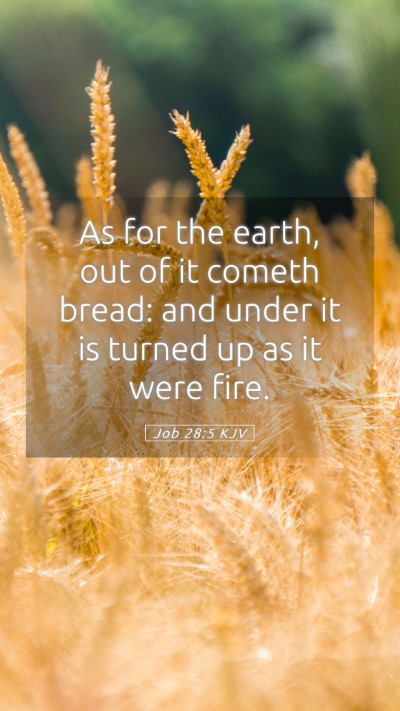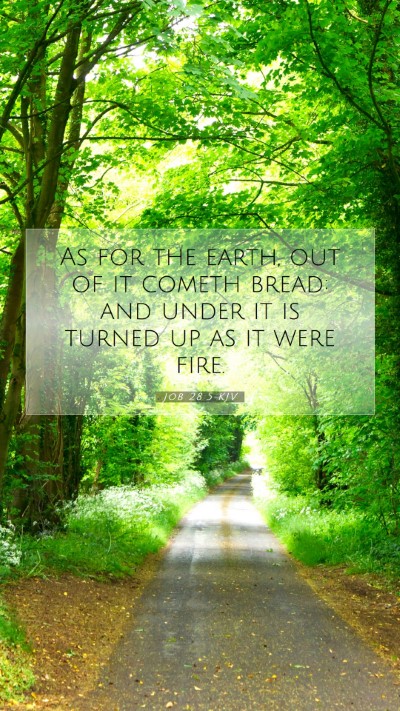Old Testament
Genesis Exodus Leviticus Numbers Deuteronomy Joshua Judges Ruth 1 Samuel 2 Samuel 1 Kings 2 Kings 1 Chronicles 2 Chronicles Ezra Nehemiah Esther Job Psalms Proverbs Ecclesiastes Song of Solomon Isaiah Jeremiah Lamentations Ezekiel Daniel Hosea Joel Amos Obadiah Jonah Micah Nahum Habakkuk Zephaniah Haggai Zechariah MalachiJob 28:5 Meaning
What is the meaning of Job 28:5?
As for the earth, out of it cometh bread: and under it is turned up as it were fire.
Job 28:5 Bible Verse Meaning
Job 28:5 - Understanding the Profound Meaning
In this analysis of Job 28:5, we delve into the rich layers of biblical meaning and interpretation derived from reputable public domain commentaries. This verse, which states, "As for the earth, out of it comes bread: and under it is turned up as it were fire," captures the essence of human existence, the natural world, and the divine order.
Overview of Job 28:5
This verse occurs within a passage often referred to as God's wisdom and creation. It highlights the paradox of earthly prosperity arising from the depths of the earth, which can be likened to fire, signifying both the power and danger of nature.
Insights from Public Domain Commentaries
Matthew Henry's Commentary
According to Matthew Henry, this verse emphasizes the earth’s capacity to yield provision ('bread') while simultaneously revealing the destructive aspects represented by 'fire.' Henry notes that the wisdom of God underpins this duality, illustrating how creation can provide sustenance and also serve as a metaphor for refinement and judgment.
Albert Barnes' Commentary
Albert Barnes expands on the notion that this verse reflects the fundamental principles of nature and the spiritual implications concerning human reliance on God's creation. He argues that the earth not only produces bread for physical nourishment but also represents the deeper spiritual truths found in the pursuit of wisdom and understanding, acknowledging that divine counsel is essential to extract meaning from life.
Adam Clarke's Commentary
Adam Clarke highlights the geographical and botanical aspects of 'bread' emerging from the earth. He suggests that this verse serves as a metaphor for the usefulness of the earth, as it brings forth resources while also alluding to the secret depths where 'fire' (possibly representing intense trial or tribulation) originates. Clarke implies that wisdom from God enables us to navigate through life's trials, which are depicted by the hidden aspects of the earth.
Key Themes and Spiritual Insights
- The Dual Nature of Creation: Job 28:5 demonstrates how God's creation serves both to sustain life and to represent danger, echoing the biblical theme that wisdom and fear of the Lord are foundational to understanding this duality.
- Provision and Sovereignty: The reference to 'bread' symbolizes providence, where God provides sustenance through the earth, reinforcing the biblical doctrine that all resources are under God's control.
- Spiritual Mineralization: The fire mentioned signifies trial, purification, and the wisdom that emerges from navigating life's challenges, pointing to the ongoing need for divine wisdom.
- Wisdom’s Search: This verse suggests that wisdom is of utmost importance and must be actively sought, as it is not readily visible but lies beneath the surface.
Cross-References
For a deeper understanding, consider these related scriptures:
- Psalm 104:14 – "He makes grass grow for the cattle, and plants for people to cultivate—bringing forth food from the earth."
- Proverbs 3:19 – "The Lord by wisdom founded the earth; by understanding He established the heavens."
- Isaiah 33:14-16 – Discusses the fear of the Lord as a pathway to wisdom and protection.
Conclusion: The Importance of Bible Verse Interpretations
In summary, Job 28:5 invites profound reflection on the relationship between human existence and divine wisdom. This analysis is crucial for anyone engaging in Bible study or seeking to deepen their understanding of Scripture. The insights from Matthew Henry, Albert Barnes, and Adam Clarke illuminate the nuances of this passage, making it a vital aspect of Bible verse commentary.
As we engage with our Bible study tools and resources, let us consider how the interpretation of challenging passages like Job 28:5 applies to our daily lives, enriching our spiritual journeys.


